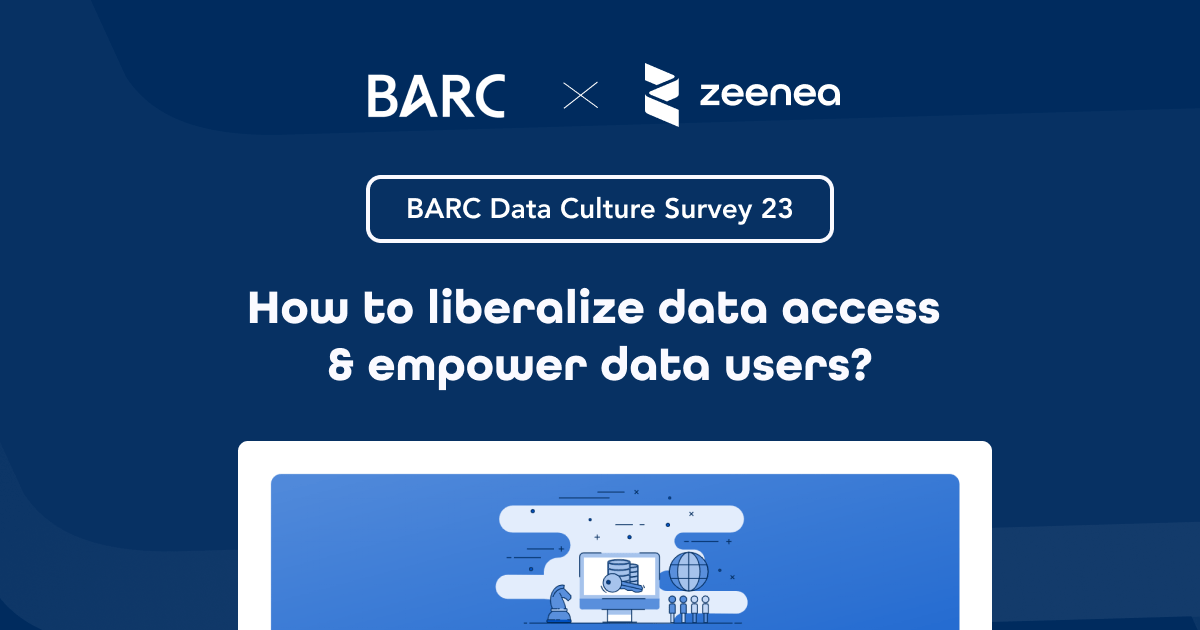How to Liberalize Data Access – Check out BARC’s Data Culture Survey 23
Actian Corporation
November 28, 2022

“Data culture eats data strategy for breakfast” is a powerful saying among data & analytics managers that underlines the importance of aligning data strategy & organizational culture for operational success. Indeed, data culture is a people matter. Data becomes a high-value asset when it is shared and available to everyone in an organization.
In last year’s BARC Data Culture Survey 22, “data access” was selected as the most relevant aspect of BARC’s ‘Data Culture Framework’. Therefore, this year, BARC examined the current status, experiences, and plans of companies concerning their efforts to create a positive data culture with a special emphasis on ‘data access’. In this article, discover the 8 key findings of BARC’s Data Culture Survey 23.
Management Survey: 8 Data Culture Findings in Data-Driven Companies
1. Decisions are Made Based on a Mixture of Data and Gut Feeling
Following an increase in 2021, the proportion of companies making primarily data-driven decisions has remained stable this year with 50 percent stating that they generally base their decisions on a combination of data and gut feeling.
2. Data Knowledge is Essential to Data and Analytics
Almost three-quarters of respondents state that they have recognized the need to invest in ways to access, link, and understand metadata. However, some of the tools used are not very widespread yet.
3. Data Culture is Beneficial
Almost half of the companies surveyed count improved decision-making among the goals they have achieved, and more than a third have achieved continuous process improvements and cost reductions through the use of data. However, expectations are much higher and more diverse.
4. Data Literacy, Leadership, and Communication Need a Boost
According to survey participants, data leadership, data communication, and data literacy initiatives have only been launched by around 20 percent. The CxO perspective is quite different: 81 percent of CxOs claim that data literacy is already in place or planned, and 78 percent say the same for data communication.
5. Companies Seem to Focus on the Wrong Actions
The biggest reported obstacles to implementing a data culture are a lack of resources, a lack of knowledge, a lack of roles and responsibilities, and inadequate communication – but it is precisely these obstacles that are the least frequently addressed in concrete initiatives.
6. Most Companies Believe in the ‘Right to Know’ Approach
Companies today still predominantly follow the ‘need to know’ principle, which means data access is only granted on request. 59 percent of respondents see greater advantages in the more liberal ‘right to know’ approach.
7. The Conditions for the Democratization of Data Access are not yet in Place
The biggest challenges to liberalizing data access are a lack of data knowledge on the part of users and enabling simple access methods. Many of the conditions for better data access must therefore be created first.
8. True Data-Driven Companies Rely on Modern Concepts, Technologies, and Metadata
Best-in-class companies use technologies and concepts beyond ‘classic’ business intelligence tools. These include tools for metadata management (e.g., data catalogs, data intelligence platforms), tools for data virtualization, organizational concepts (e.g., data mesh), and architectural concepts and principles such as data fabric.
Subscribe to the Actian Blog
Subscribe to Actian’s blog to get data insights delivered right to you.
- Stay in the know – Get the latest in data analytics pushed directly to your inbox.
- Never miss a post – You’ll receive automatic email updates to let you know when new posts are live.
- It’s all up to you – Change your delivery preferences to suit your needs.
